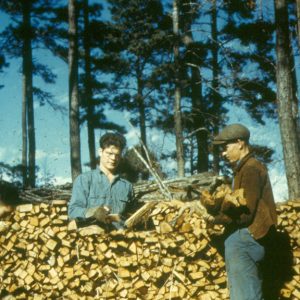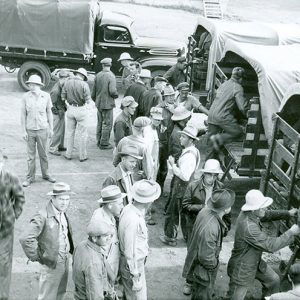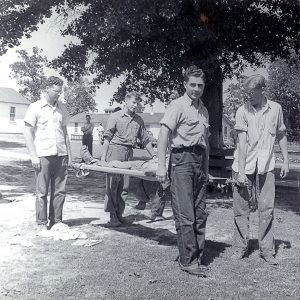calsfoundation@cals.org
Camp Magnolia
Camp Magnolia, also known as Civilian Public Service Camp No. 7, was the only World War II–era work camp in Arkansas established for religious conscientious objectors (COs). There, COs engaged in much the same work as the Civilian Conservation Corps (CCC) and took part in government-controlled medical experiments.
The Selective Training and Service Act of 1940 contained a provision that allowed those who objected to military service on grounds of religious or personal beliefs to render public service for the nation in alternative settings. This provision had been the result of intense lobbying by historic peace churches, such as the Society of Friends (Quakers), the Mennonites, and the Church of the Brethren. When conscription for the anticipated war began on October 16, 1940, these churches formed the National Council for Religious Conscientious Objectors to work with the government in overseeing the placement of COs. These COs were made a part of Civilian Public Service (CPS), engaging in work similar to that of the CCC in 152 camps across the nation. Most of the camps were directed by church organizations.
Camp Magnolia was established in June 1941 in a former CCC camp near Magnolia (Columbia County), about a mile north of what is now Southern Arkansas University (SAU), and was overseen by J. H. Mathis, previously the district superintendent in Minnesota for the Church of the Brethren. The men at the camp worked forty hours a week on soil conservation projects, mostly on local farms, where they constructed dams and reservoirs and planted trees. Some complained in later interviews that their labor was actually used to build resort ponds for local large landowners. COs were not paid for their work; in fact, they were required to pay for their own room and board or have their home church raise the money. Of the approximately 400 men who served at Camp Magnolia, only nine were native Arkansans. Those from other states included a few African Americans who found the camp to be an open and liberal environment even as they experienced the deep racism of the surrounding area.
The men were free to leave the camp when not working and often participated in community activities, though they occasionally faced hostility from pro-military locals. On March 22, 1942, a group of three COs from the camp was surrounded by a mob of approximately seventy-five in the town of McNeil (Columbia County) after spending some free time painting and writing poetry. One of the townspeople, reading CO Chuck Worley’s poem about trains, believed him to be recording information about troop trains for a foreign enemy, and others began to call for the three men to be lynched. A Magnolia policeman and federal official intervened and took the three back to the camp.
At many work camps, COs volunteered to participate in medical experiments overseen by the U.S. Army’s Office of Scientific Research and Development. Many of these were warfare-related experiments examining issues of disease and malnutrition. At Camp Magnolia, fifty men began a three-month stint of eating dehydrated grass tips in March 1943. The goal was to see if such fare could be used during a food shortage.
Though the CPS program continued nationally until 1947, on April 10, 1944, a tornado struck and destroyed Camp Magnolia. The next day, the local newspaper covered the event under the headline “God Strikes the Conchies” (“conchie” being a disparaging term for conscientious objector). Residents of the camp were transferred to other CPS camps throughout the nation.
For additional information:
The Civilian Public Service Story. http://civilianpublicservice.org/ (accessed September 21, 2022).
Hillier, Michelle. “Sent to Magnolia, Conscientious Objectors of ’40s Did Duty on Roads.” Arkansas Democrat-Gazette, November 26, 1995, pp. 1B, 4B.
Kilgore, Nettie Hicks. History of Columbia County. N.p: Southwest Arkansas Genealogical Society, 1976.
Morris, Cynthia Hastas. “Arkansas’s Reaction to the Men Who Said ‘No’ to World War II.” Arkansas Historical Quarterly 43 (Summer 1984): 153–177.
Stafford, William E. Down in My Heart: Peace Witness in War Time. Corvallis: Oregon State University Press, 1998.
Stephens, Oren. “We’ll Shed Sweat—But Not Blood.” Arkansas Democrat Sunday Magazine. September 14, 1941, p. 1.
Staff of the CALS Encyclopedia of Arkansas


 Camp Magnolia COs
Camp Magnolia COs  Camp Magnolia Workers
Camp Magnolia Workers  Camp Magnolia
Camp Magnolia 



Comments
No comments on this entry yet.